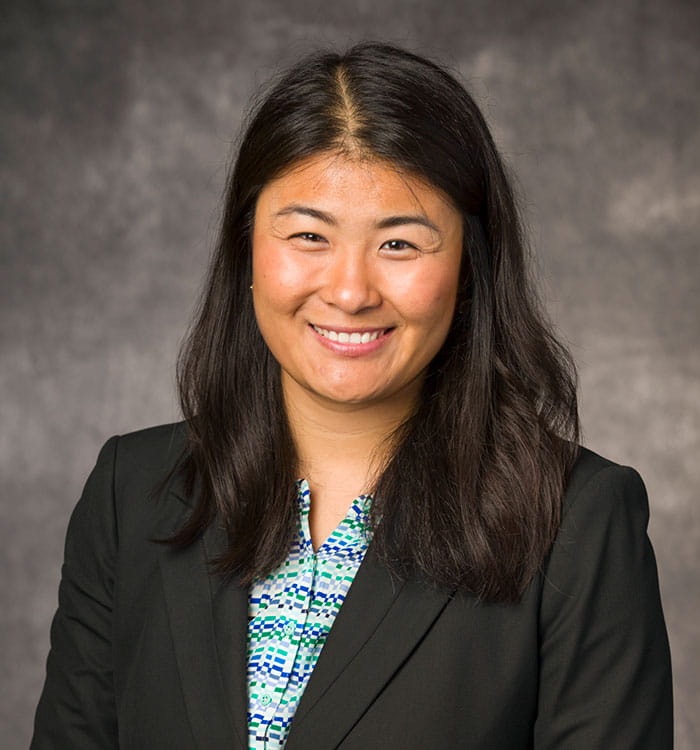University Hospitals RISE Programs Approach to Caring for Mothers and Children Affected by Substance Exposure
July 04, 2022
Innovations in Obstetrics & Gynecology | Summer 2022
University Hospitals has for years offered a perinatal addiction clinic, but in summer 2021, it developed a new approach to treating addiction: the Rainbow Interdisciplinary Substance Exposure (RISE) program.
 Lulu Zhao, MD
Lulu Zhao, MD“RISE is a continuum of services for mothers and their children, from pregnancy to postpartum to the child stage,” says Lulu Zhao, MD, Department of Obstetrics & Gynecology, University Hospitals Cleveland Medical Center.
Dr. Zhao directs one of the three clinics that work together to provide care through the RISE program and provides OB care, addiction care and dual diagnosis care through the RISE-Moms clinic, which serves women with substance use issues who are considering pregnancy, are pregnant, or are within their first year postpartum. Women are supported through their pregnancy journey with specialty prenatal and psychiatric care, psychosocial supports through Rainbow Connects and consultations with experts including Moira Crowley, MD, a neonatologist at the University Hospitals Rainbow Babies & Children’s Hospital who treats neonates affected by substance exposure.
Care does not, however, stop at RISE. The RISE-Peds clinic serves a primary point of care for substance-exposed children from birth to the age of 3. Natalie Woods, MD, Director, UH Rainbow Center for Women and Children, approaches care through the lens of family dynamics and substance exposure in relation to babies’ development. Finally, Catherine Lipman, MD, Director of the RISE Developmental-Behavioral Pediatrics and Psychology (DBPP) Clinic, provides care for children up to 9 years old who have been affected by substance use.
The three RISE clinics are linked by a central coordinator. While medicine sometimes operates in silos, the RISE program is designed to create a continuum of care supported by regular communication among multiple providers. “We are able to communicate about what's going on in all aspects of the dyad,” says Dr. Zhao. The RISE team has a weekly interdisciplinary huddle, giving them a clear picture of all patients being treated through the program.
Patients typically enter the RISE program via referral, and Dr. Zhao has also had patients who return to her for care during a subsequent pregnancy. Accessing this kind of care can be a challenge for patients due to geographic distance or psychosocial circumstances. Women struggling with substance use may also be facing other issues, such as domestic violence or homelessness. Dr. Zhao tries to manage and prioritize the needs of her patients, meeting them where they are and focusing on goals important to them.
And even with all of its success, RISE is always looking to strengthen community relationships that can give additional patients ready access to the resources they need. “A huge priority for RISE is growing community partnerships to leverage existing services and supports to benefit our patients,” says Dr. Zhao.
One way the RISE program is engaging with patients and the community is through twice-monthly virtual lunch and learns. These virtual sessions, open to anyone, feature expert speakers on a wide variety of topics related to substance use and families, such as domestic violence, trauma and postpartum depression. Sessions are not recorded, and participations can join anonymously.
The RISE program is funded by a five-year grant, and the team plans to continue seeking funding to support it. They want to continue offering comprehensive care – OB care, contraception, medication-assisted treatment (MAT), counseling and pediatrics – for dyads affected by substance use and to develop a strong web of resources in the community.
Already, patients are positively responding to the care they have received and the relationships they have developed through the RISE program. “I've seen women come in postpartum, and they say, ‘Thank you so much for trusting me and believing me, giving me time and not judging me as a bad person,’” says Dr. Zhao.
That trust and care meet the needs of a diverse range of patients. Some women are in sobriety when they deliver, while others have never been in sobriety. UH is striving to connect these patients to the resources they need.
“Our goal is to know wherever you are and meet you where you are and optimize things as much as possible for you,” says Dr. Zhao. “A lot of women, especially younger reproductive-aged women, are expected statistically to be able to enter recovery. It's just a matter of finding the right people to support them.”


